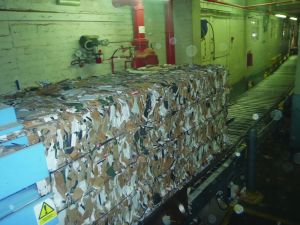Smurfit Kappa’s Northampton plant produces packaging such as fruit and vegetable trays, fresh produce boxes and retail ready packaging. The hydraulic baler is used to compact offcuts from the company’s cardboard processing lines into large bales ready for transport to a recycling plant.
The company wanted to improve the energy efficiency of the baler, which uses a motor driven pump to compress the hydraulic fluid. This motor originally ran at a fixed speed. When hydraulic pressure reached the set point, excess fluid was diverted through a pressure relief valve. This excess fluid represented wasted energy that had not resulted in any useful work.
Another problem was the excess temperatures generated by the constant use, leaving the hydraulic motor on full demand meant that Smurfit Kappa had to install an additional motor-driven fan to keep it cool.
Smurfit Kappa and IDS monitored the energy use of the baler. Investigations showed that the measured power consumption was 11.1kW and the baler ran for 6,336 hours. At an energy cost of 8p/kWhr, this gave a total running cost of the baler of £5,626.
IDS installed a 30kW ABB general purpose drive, ACS550, as well a pressure transducer.
Andy Crocker of IDS said, ‘The pressure transducer gives a 4-20mA output that is proportional to the pressure. On the drive, we have the set point at just below the valve opening pressure. When the hydraulic ram is moving and fluid is therefore flowing, pressure drops, so the drive speeds up the motor to maintain pressure. When the ram is not moving, pressure rises so the drive slows the motor.’
This arrangement means the drive can always give the pressure and flow needed without opening the relief valve and wasting the pressure in the fluid.
Following installation of the variable speed drive, which took less than a day to complete, the power consumption was measured again and shown to be 5.6kW. This gave a reduced energy cost of £2,838 a year, a saving of £2,788, with a payback time of just over 17 months.

